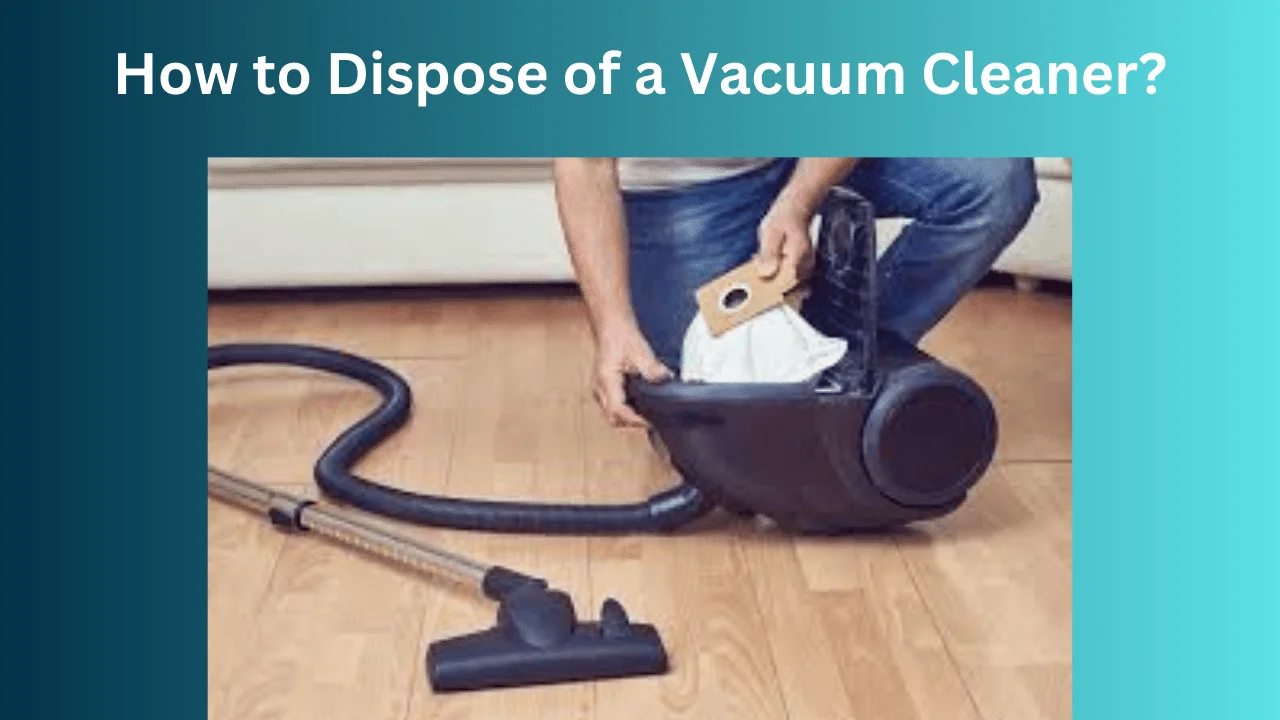Household appliances, such as vacuum cleaners, have a much shorter lifespan in this age of fast technological advancements, which has increased waste and environmental concerns. How to Dispose of a Vacuum Cleaner: If you want to help the environment and keep your home clean, you need to know how to properly dispose of a vacuum cleaner. Homeowners and eco-conscious individuals can benefit from this all-inclusive guide’s explanation of the many safe and effective ways to dispose of old vacuum cleaners. This article is a foundational piece in raising awareness about the need to reduce electronic waste and its negative impacts by investigating possibilities like recycling, donating, and selling old vacuum cleaners.
Understanding Vacuum Cleaner Disposal
The once-simple vacuum cleaner has developed into a sophisticated electronic device with a plethora of recyclable and potentially harmful parts. In order to promote recycling and reuse and avoid environmental contamination, it is crucial to dispose of these appliances properly. This segment explores the importance of proper disposal practices for people looking to make informed decisions about their old or broken vacuum cleaners.
Recycle Vacuum Cleaner
An essential part of waste management is recycling, which enables the recovery of useful materials such as metals and plastics. Disassembling vacuum cleaners and recovering usable parts is an area of expertise for e-waste facilities and scrap yards, which helps to decrease the amount of trash that ends up in landfills. You can dispose of your vacuum cleaner in an eco-friendly way by participating in local recycling programs or manufacturer take-back schemes.
Recycle Your Old Vacuum
You can help those in need and prolong the life of a functional vacuum cleaner by donating it. Home appliances that are still in good working order are greatly appreciated by many donation centers and charitable organizations. Giving back to the community in this way helps with waste reduction and welfare programs.
Sell Old Vacuum Cleaner
There is a monetary incentive to dispose of a used but functional vacuum cleaner by selling it. Used appliances are often found in garage sales, online marketplaces, and secondhand shops. In addition to providing a means of financial support, this strategy encourages the repurposing of electronic items, hence reducing the need for brand-new products.
Environmental Impact of Vacuum Disposal
It is critical to comprehend the ecological consequences of incorrect vacuum disposal. Batteries and electronic circuits are two examples of the hazardous materials that can pollute groundwater and endanger wildlife and humans alike. Reducing the ecological footprint of household waste is possible through individuals’ choices in responsible disposal methods, which contribute to environmental protection and sustainability efforts.
Vacuum Cleaner Parts Recycling
The individual parts of many vacuum cleaners are designed to be recycled or reused. More efficient recycling processes are achieved by segregating various components, such as hoses and filters. You can rest assured that your vacuum cleaner will be recycled to its maximum capacity because specialized facilities can handle these materials.
Individuals can make a big difference in conservation efforts and make sure their old vacuums are recycled or disposed of in an eco-friendly way by following these guidelines for responsible disposal. In our mission to create a cleaner, greener planet, this guide seeks to educate readers and motivate them to take action by emphasizing the significance of conscious decision-making when it comes to disposing of appliances.
Extending Vacuum Cleaner Life
You can help the environment and your wallet by getting more use out of your vacuum cleaner before you think about throwing it away. You can prolong the life of your vacuum and cut down on replacements by fixing and maintaining it.
Regular Maintenance and Cleaning
If you want your vacuum cleaner to last as long as possible and keep working well, maintenance is the key. Avoid damage and keep the suction power up by cleaning the filters, emptying the dust container or bag, and checking for hose clogs. You can get a lot more use out of your vacuum by giving it regular checks and cleanings.
Professional Repairs and Servicing
When problems persist after standard troubleshooting, it may be more cost-effective to have a professional fix your vacuum cleaner instead of buying a new one. You can save money and get your appliance back in working order by taking advantage of the many repair services offered by manufacturers and local businesses.
Upgrade Parts Instead of Replacing
Consider replacing worn out components like brushes, belts, or filters on your vacuum instead of throwing it out when it stops working. In addition to extending the life of your vacuum, this is a greener option than disposing of the whole thing.
Repurpose Vacuum Cleaner Components
Reusing and recycling parts from old vacuum cleaners can give them a second chance at usefulness. A few examples of this kind of repurposing include motors for do-it-yourself tasks and hoses for use in the garden. This fresh method promotes reusing and recycling items and lessens the amount of trash that ends up in landfills.
Local Regulations for Appliance Disposal
When getting rid of a vacuum cleaner, be sure to follow all local regulations. When it comes to recycling or otherwise disposing of old electronics, different areas have different regulations in place to protect the environment.
Understanding Local E-Waste Laws
To be in compliance, research the local regulations regarding the disposal of electronic waste. A lot of places have bins specifically for old electronics, and some even come with pickup services for bigger stuff. You can help avoid legal trouble and lend a hand to recycling initiatives in your community by disposing of your vacuum cleaner in line with these regulations.
Special Disposal Days and Events
There are often designated disposal days or events in many communities for old electronics. If you’re looking for an easy and environmentally friendly way to get rid of your old vacuum and other electronics, these events are for you.
Contacting Local Waste Management Authorities
Get in touch with your city’s waste management agency if you need clarification on how to properly dispose of your vacuum cleaner. Their knowledge of local recycling facilities, e-waste disposal options, and collection dates can be invaluable.
Minimizing Environmental Impact of Vacuum Disposal
Improper disposal of vacuum cleaners can cause serious damage to the environment. But there are ways to lessen this effect and help ensure a sustainable future.
Choosing Eco-Friendly Disposal Options
If you’re concerned about the environment, you can choose to have your old electronics recycled at facilities that focus on electronic waste or donated to organizations that find new uses for old appliances. Making these decisions will lessen your vacuum’s impact on the environment because their materials can be recycled or reused.
Battery Disposal for Vacuums
The batteries used in vacuum cleaners, particularly cordless models, are a particular disposal concern because of the chemicals they contain. To prevent batteries from ending up in landfills, where they could release toxic chemicals, many local recycling centers have specific procedures for their disposal.
Participating in Manufacturer Take-Back Programs
You can find take-back or recycling programs for vacuum cleaners offered by many manufacturers. Many manufacturers have the means to recycle or refurbish these appliances, so taking part in these programs is a great way to get rid of your old vacuum cleaner in an easy and effective way.
FAQs
Can vacuum cleaner filters be recycled?
Yes, some vacuum cleaner filters can be recycled, especially those made of plastic. However, it’s best to check with local recycling centers for specific guidelines.
What should I do with a broken vacuum cleaner?
Consider recycling it at an e-waste facility, donating it for parts, or contacting the manufacturer for a take-back program.
Are there any eco-friendly vacuum cleaners?
Yes, some brands offer eco-friendly models made from sustainable materials and designed for energy efficiency and easier recycling.
How can I find a local e-waste disposal facility?
Check with your municipal waste management department or search online for e-waste recycling centers in your area.
Is it better to repair or replace an old vacuum cleaner?
It depends on the extent of the damage and the cost of repairs. If repairs are minor and cost-effective, repairing is a more sustainable option.
Conclusion
People can make a significant difference in lowering the environmental impact of vacuum cleaner disposal by following these practices. How to Dispose of a Vacuum Cleaner: Proper disposal involves several steps to ensure minimal harm to the environment. First, consider donating or selling the vacuum if it’s still functional. If it’s beyond repair, check for local recycling programs that accept electrical appliances, as many components can be recycled. Additionally, some manufacturers offer take-back or recycling programs for their products. Finally, if recycling is not an option, ensure you dispose of the vacuum as per your local municipality’s guidelines for electronic waste. What matters most is that we make well-informed choices that are good for the earth and the generations to come.

Shannon Reyes is a seasoned writer with a knack for crafting engaging blogs on a variety of service industries, including plumbing, cleansing, moving, pest control, and roofing. With a keen eye for detail and a passion for helping readers navigate complex topics, Shannon brings her expertise to life through informative and accessible content.












Thank you for your sharing. I am worried that I lack creative ideas. It is your article that makes me full of hope. Thank you. But, I have a question, can you help me? https://www.binance.info/register?ref=IXBIAFVY
Thank you for your sharing. I am worried that I lack creative ideas. It is your article that makes me full of hope. Thank you. But, I have a question, can you help me?
I don’t think the title of your article matches the content lol. Just kidding, mainly because I had some doubts after reading the article.